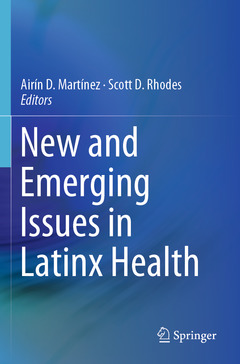Description
New and Emerging Issues in Latinx Health, 1st ed. 2020
Coordinators: Martínez Airín D., Rhodes Scott D.
Language: English
Subjects for New and Emerging Issues in Latinx Health:
Keywords
Latina health; Latino health; racial minority health; ethnic minority health; health disparities; racial and ethnic disparities; health equity; intervention development; prevention; health behavior; community engagement; health inequities; policy and leadership; immigrant health; migrant health; demographic trends; epidemiology; health and well-being; population health; community health
Publication date: 08-2020
Support: Print on demand
Publication date: 08-2019
Support: Print on demand
Description
/li>Contents
/li>Biography
/li>Comment
/li>
This volume is being published at a critical time in U.S. history and serves as a comprehensive and much-needed update to what is known about Latinx health. As both the United States and Latinx subgroups experience demographic shifts, it is critical to examine the current epidemiology of Latinx health, as well as the factors influencing the health and well-being of this growing population.
Chapters in this book, written by highly respected experts, illuminate the diversity of the Latinx population and provide strategies to mitigate many of the challenges they face, including challenges related to migrating to new destinations. The book is designed to enrich dialogue around the multilevel determinants of Latinx health and concludes with a call to action for increased culturally congruent, theoretically informed and participatory Latinx health research. The book also encourages the mentorship and growth of early career and junior investigators to conduct research on Latinx health issues.A selection of the perspectives included among the chapters:
- Chronic disease and mental health issues in Latinx populations
- Substance use among Latinx adolescents in the United States
- Physical and intellectual and developmental disabilities in Latinx populations
- Health insurance reform and the Latinx population
- Immigration enforcement policies and Latinx health
- Research priorities for Latinx sexual and gender minorities
- Racial and ethnic discrimination, intersectionality, acculturation, and Latinx health
New and Emerging Issues in Latinx Health is an invaluable compendium that provides a foundation of understanding Latinx health and well-being and guides future research and practice. The book is essential for researchers, practitioners, and students in the fields of public health and the social sciences including community and health psychology, health administration and policy, community health education, medical anthropology, medical sociology, population health, and preventive medicine. Moreover, the chapters in this volume are also relevant for federal, state, and local agencies, including health departments, and other Latinx- and immigrant-serving community organizations.
- Eliseo J. Pérez-Stable, MD, Director of the National Institute of Minority Health and Health Disparities
- David Hayes-Bautista, MD, PhD, Professor of Medicine and Director of the Center for the Study of Latino Health and Culture at the School of Medicine, UCLA. David Hayes-Bautista was the first person of color to graduate from the medical sociology program at UCSF.
- Ruth E. Zambrana, PhD, Professor at the University of Maryland, College Park, Department of Women’s Studies, Director of the Consortium on Race, Gender and Ethnicity, Interim Director of the U.S. Latino Studies Initiative at the University of Maryland, College Park, and Adjunct Professor of Family Medicine at University of Maryland Baltimore, School of Medicine, Department of Family Medicine
Airín D. Martínez, PhD, is assistant professor in the Department of Health Promotion & Policy at the School of Public Health & Health Sciences at the University of Massachusetts-Amherst.
Scott D. Rhodes, PhD, MPH, FAAHB, is professor and chair of the Department of Social Sciences and Health Policy Division of Public Health Sciences, at Wake Forest School of Medicine, in Winston-Salem, North Carolina.
Highlights the current state of Latinx health and well-being in the United States, as well as successful research and interventions for this population
Reflects current data and explores previously uncovered topics, such as the health of sexual and gender minorities, including LGBT persons and disabled persons, and the consequences of the Affordable Care Act (ACA) on Latinx subgroups
Discusses how macro-levels of the ecological model, such as immigration policy, ACA, leadership, built environment, migration processes, and multiple forms of discrimination, influence Latinx health outcomes in the U.S.
Identifies the gaps in the current research and promising strategies for intervention that need to be prioritized given the evolving U.S. population



